EAHIL 2024 – askeleita ja loikkia | EAHIL 2024 – steps and leaps
(Please, scroll down, after the photos, to read in English.)
The European Association for Health Information and Libraries (EAHIL) yhdistää eurooppalaisia – ja jonkin verran Euroopan ulkopuolisiakin – lääketieteen ja terveystieteiden kirjastoissa ja tietopalveluissa työskenteleviä kirjasto- ja tietopalveluammattilaisia. Järjestö tukee jäsentensä ammatillista kehitystä, edistää yhteistyötä ja mahdollistaa kokemusten vaihtoa tärkeimpänä keinonaan vuotuiset tapahtumat, vuorovuosin konferenssit ja workshopit. Tämänvuotinen konferenssi pidettiin Riiassa Latviassa 12.-15.6. Teema oli ”Small Step and a Giant Leap: Reorienting Towards a New Environment”.
Täydennyskoulutuskurssi
Varsinaista konferenssia edelsivät täydennyskoulutuskurssit. Osallistuin tiistaina kurssille ”Beyond the systematic review search: search methods for Evidence and Gap Maps and other review type”. Morwenna Rogersin (Exeterin yliopisto), Anthea Suttonin (Sheffieldin yliopisto) ja Alison Bethelin (Exeterin yliopisto) pitämä kurssi oli hyödyllinen johdatus kehittyneisiin tiedonhaun menetelmiin ja tapoihin. Kurssin oppeja jaan (lomien jälkeen) kollegoideni kanssa, jotta voimme tukea tutkijoita entistä paremmin erilaisten katsausjulkaisujen tiedonhaussa. Tässä vinkkinä yksi työkalu: Right review, aiemmin tunnettu nimellä ”What Review is Right for You?”
Pääpuheet
Keynote-esitelmiä oli kaksi. Keskiviikon keynote-puhuja Kristine Paberza-Ramiresa (IFLA) puhui yhteisökeskeisestä vaikuttavuuden arvioinnista. Perjantain keynote-puhuja Andrea Gasparini (Oslon yliopisto) korosti, että tekoälyn käyttö tutkimuskirjastoissa on enemmän olemassa olevien prosessien automatisointia kuin todellisen älykkyyden luomista. Nykyiset tekoälyjärjestelmät nojaavat vahvasti ihmisten luomaan dataan ja toimintaan, joten vaikka tekoäly voi merkittävästi parantaa tehokkuutta, se ei korvaa ihmisen älykkyyttä. Gasparini korosti käyttäjäkeskeisen suunnittelun merkitystä tekoälytyökalujen kehittämisessä. Asettamalla käyttäjäkokemus etusijalle kirjastot voivat varmistaa, että nämä teknologiat ovat sekä tehokkaita että eettisesti toimivia.
Työpajat
Osallistuin keskiviikkona työpajaan ”Creating a brand for your library”, jonka piti Suzannah Bridge (Oxfordin yliopisto, Bodleian-kirjasto) ja joka oli hyödyllinen ja hauska. Torstaina vedin itse työpajan otsikolla ”Promoting and marketing library and information services: tips and tools for creating a communication plan”. Työpajassani oli 14 aktiivista osallistujaa.
Paneelikeskustelu
Tekoälyteemaa käsiteltiin myös torstain paneelikeskustelussa, johon Fiona Brownin (Edinburghin yliopisto) puheenjohtamana osallistuivat Andrea Gasparini, Simone Willis (Cardiffin yliopisto) ja Marydee Ojala (KMWorld-lehden päätoimittaja). Paneelin teema oli ”Automaation ja tekoälytyökalujen hyödyt ja rajoitukset tutkimuksessa”. Keskustelussa korostui tarve luoda ja tarkistaa ohjeita ja suosituksia, jotta ne pysyvät nopean teknologisen kehityksen tahdissa. Tärkeää on tekoälytyökalujen testaaminen käyttäjien kanssa ja kokemusten jakaminen sekä organisaatioiden sisällä että organisaatioiden välillä. Tekoälytyökaluista on hyötyä esimerkiksi systemaattisten katsausten tiettyjen vaiheiden nopeuttamisessa, mutta ihmistä ne eivät siinäkään korvaa vaan ovat vain apuna.
Rinnakkaissessio tutkimuksesta ja avoimesta tieteestä
Ohjelmassa oli paljon rinnakkaisia tapahtumia eikä kukaan voi olla kahdessa paikassa samaan aikaan, joten onnistuin kuuntelemaan vain yhden rinnakkaissession. Onneksi osallistujilla on mahdollisuus katsoa rinnakkaissessioiden tallenteita jälkikäteen. Seuraamassani sessiossa oli neljä mielenkiintoista esitystä: Iina Hepolehdon ja kollegoiden (Helsingin yliopisto) ”Data management skills for students of medical faculty and pharmacy: Our solutions”, Erik Wikströmin (HTA South) ”Differences in search strategies and corresponding outputs between matching Cochrane Reviews, Health Technology Assessment (HTA) reports and other systematic reviews”, Elena Bernardinin (Università degli studi di Milano) ja kollegoiden ”An innovative approach to supporting evidence-based Adverse Outcome Pathways: a successful case study with librarians on the project team” ja Alison Bethelin (Exeterin yliopisto) ja Klas Mobergin (SBU – Swedish Agency for Health Technology Assessment and Assessment of Social Service) ”Search summary tables – The collected wisdom of two organisations”.
Posterit
Posterinäyttelyssä kiinnostuin erityisesti kolmesta posterista: 1) ”Digital competence is essential!”, tekijät Therese Skagen, Irene Hunskår ja Regina Lein Norjasta. Heidän posteriinsa pääsi vaikuttamaan kiinnittämällä siihen pieniä tarroja sen merkiksi, millä työn osa-alueilla tarvitaan eniten lisää digitaalista osaamista. Osaamisen kehittämisen teemat kiinnostavat minua aina. 2) ”Fostering Collaboration and Community Engagement in New Library Spaces: Co-Planning, Gamification, and Shared Activities with Students and Staff”, tekijät Essi Lempiäinen ja Leeni Lehtiö (Turun yliopisto). Haluaisin pelillistää yhteiskehittämistä myös meillä. 3) ”Little Streams Make Big Rivers: Communication Strategies for an Expanded Research Service”, tekijät Camilla Larsson, Sara Landerdahl Stridsberg ja Julia Harrysson (Mälardalenin yliopisto). Kaikki viestintään liittyvä herättää mielenkiintoni, koska tehtäväni on koordinoida ja kehittää kirjastomme viestintää. Posterien tekijät myös esittelivät posterinsa ”Poster Presentation Rapid-fire” -sessiossa, joissa heillä oli minuutti puheaikaa.
Kirjastokierros
Konferenssi päättyi myöhäiseen lounaaseen, jonka jälkeen monet käyttivät tilaisuuden tutustua kansalliskirjastoon (Latvijas Nacionālā bibliotēka, perustettu 1919) muutenkin kuin alakerrosten konferenssikeskuksen osalta. Valtavassa, vuorenkaltaisesti kohoavassa, vuonna 2014 avatussa rakennuksessa on yksitoista kerrosta. Sen on suunnitellut latvialaissyntyinen, Yhdysvalloissa uransa tehnyt arkkitehti Gunnar Birkerts. Kirjaston uumeniin mahtuu lukuisia eri kokoelmia (kaikkiaan yli viisi miljoona nimekettä ja yli 18 000 käsikirjoitusta) sekä pysyviä ja vaihtuvia näyttelyitä (julisteita, esineitä ym.), ja sen yläkerroksesta on näkymät yli Riian. Kovin vähän kirjaston käyttäjiä havaitsimme tiloissa, mutta pääsimmekin vierailijapasseillamme vain tiettyihin osiin kirjastoa, emme esimerkiksi lukusaleihin.
Lopuksi
Ammatillisesti ja kollegiaalisesti antoisa konferenssi oli erittäin hyvin järjestetty. Konferenssin kokoaviksi teemoiksi muodostuivat mielessäni käyttäjäkeskeisyys ja yhdessä tekeminen. Oli sitten kyse tekoälyn ja automaation hyödyntämisestä, ammatillisen osaamisen kehittymisestä tai avoimen saatavuuden edistämisestä painopiste on kirjastojen roolin vahvistamisessa. Tekoälyn ja muun teknologian nopeasta kehityksestä huolimatta kirjasto on edelleen tutkimuksen ja oppimisen kulmakivi. Vaikka teknologia näyttää ottavan suuria kehitysloikkia, on kirjastojen parasta edetä askel kerrallaan – ei hötkyillä vaan edetä suunnitelmallisesti.
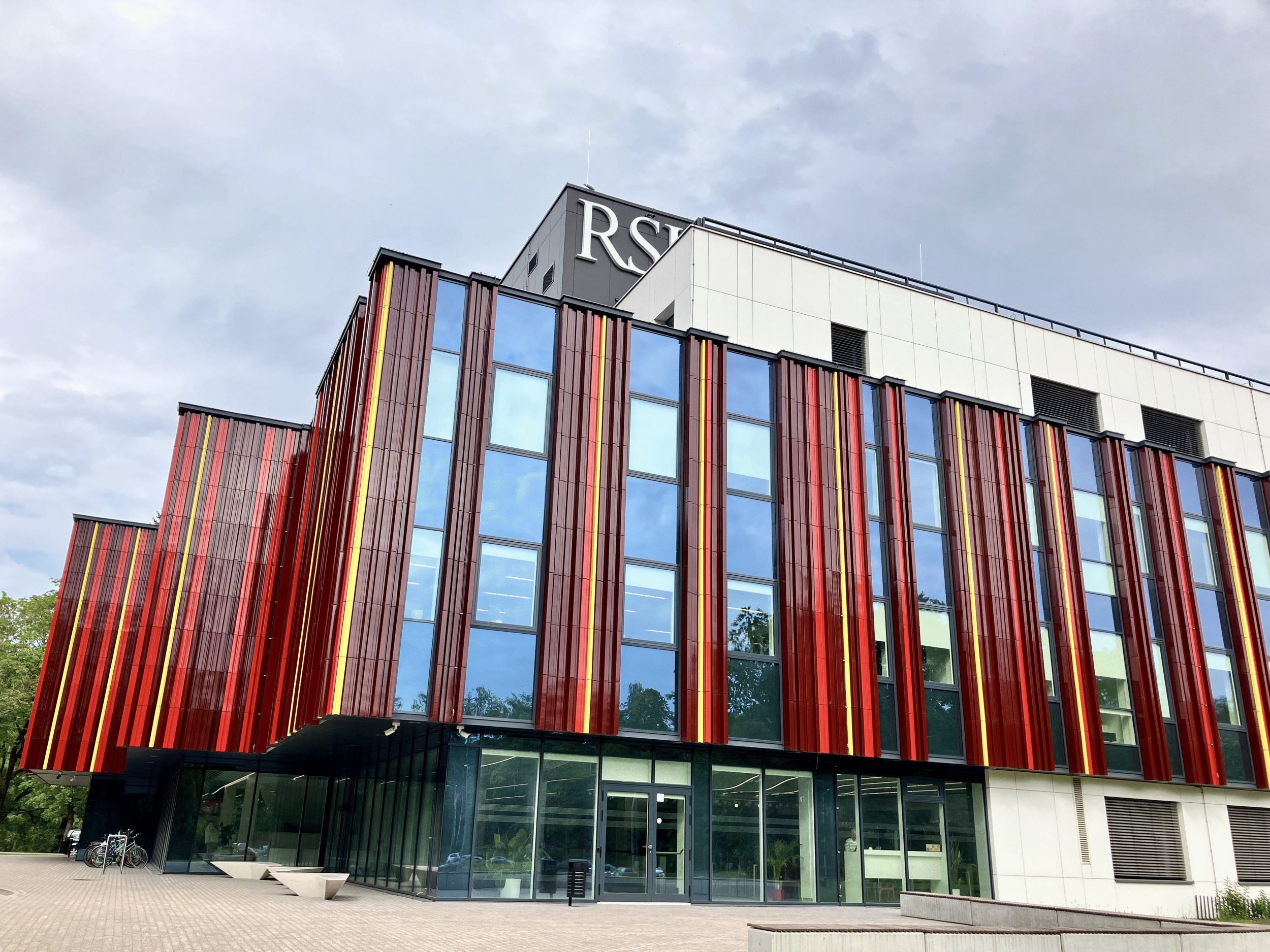
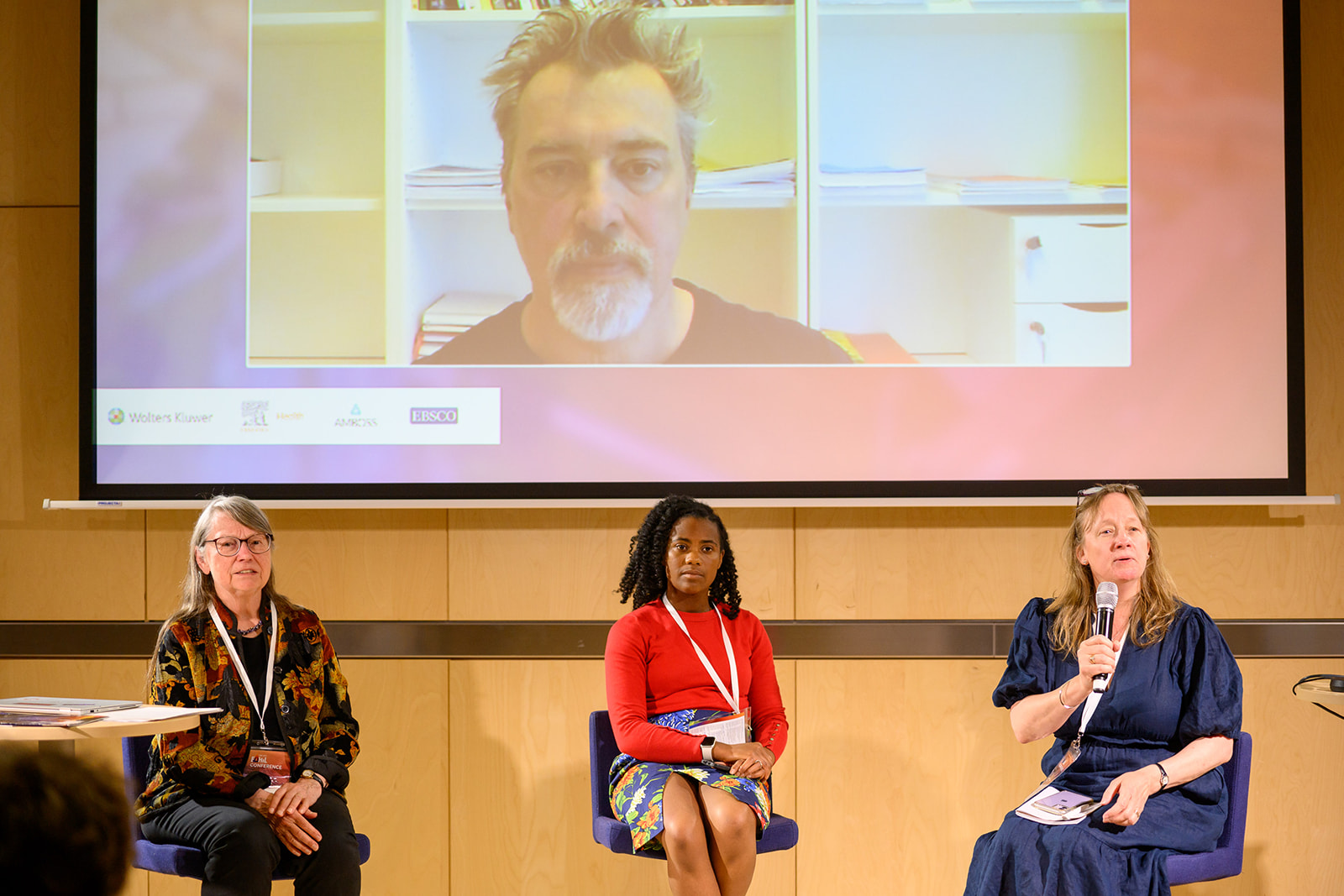
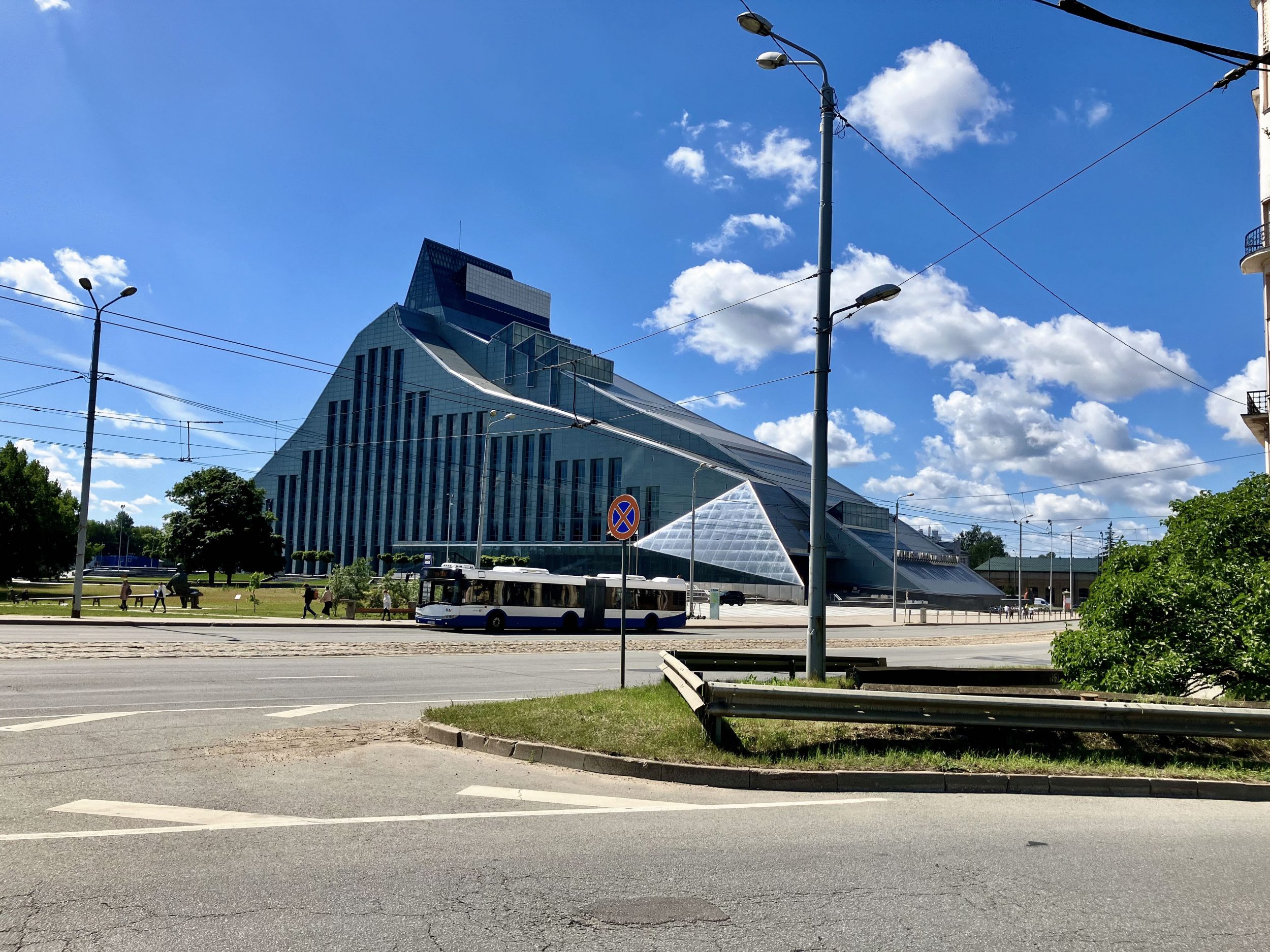
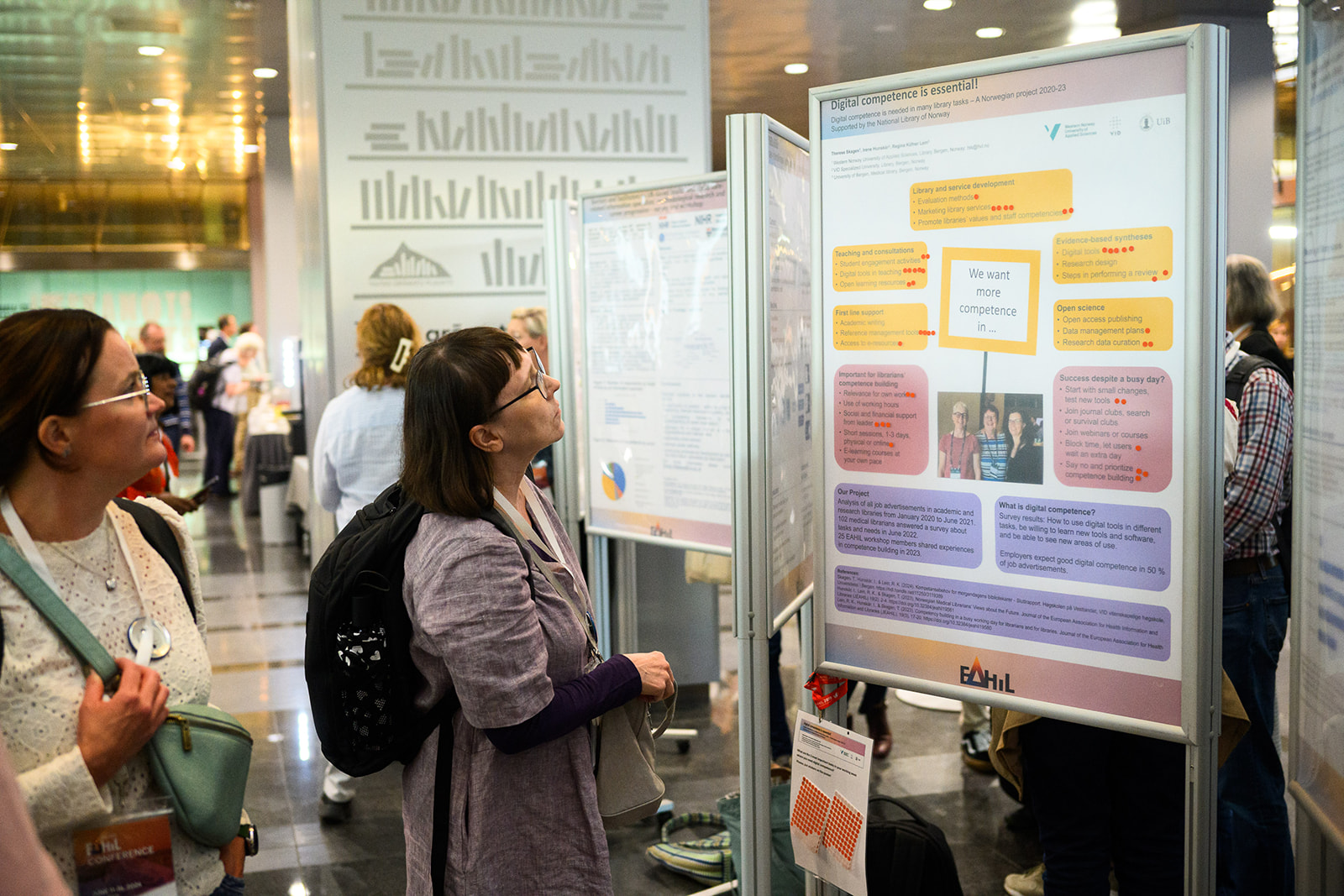
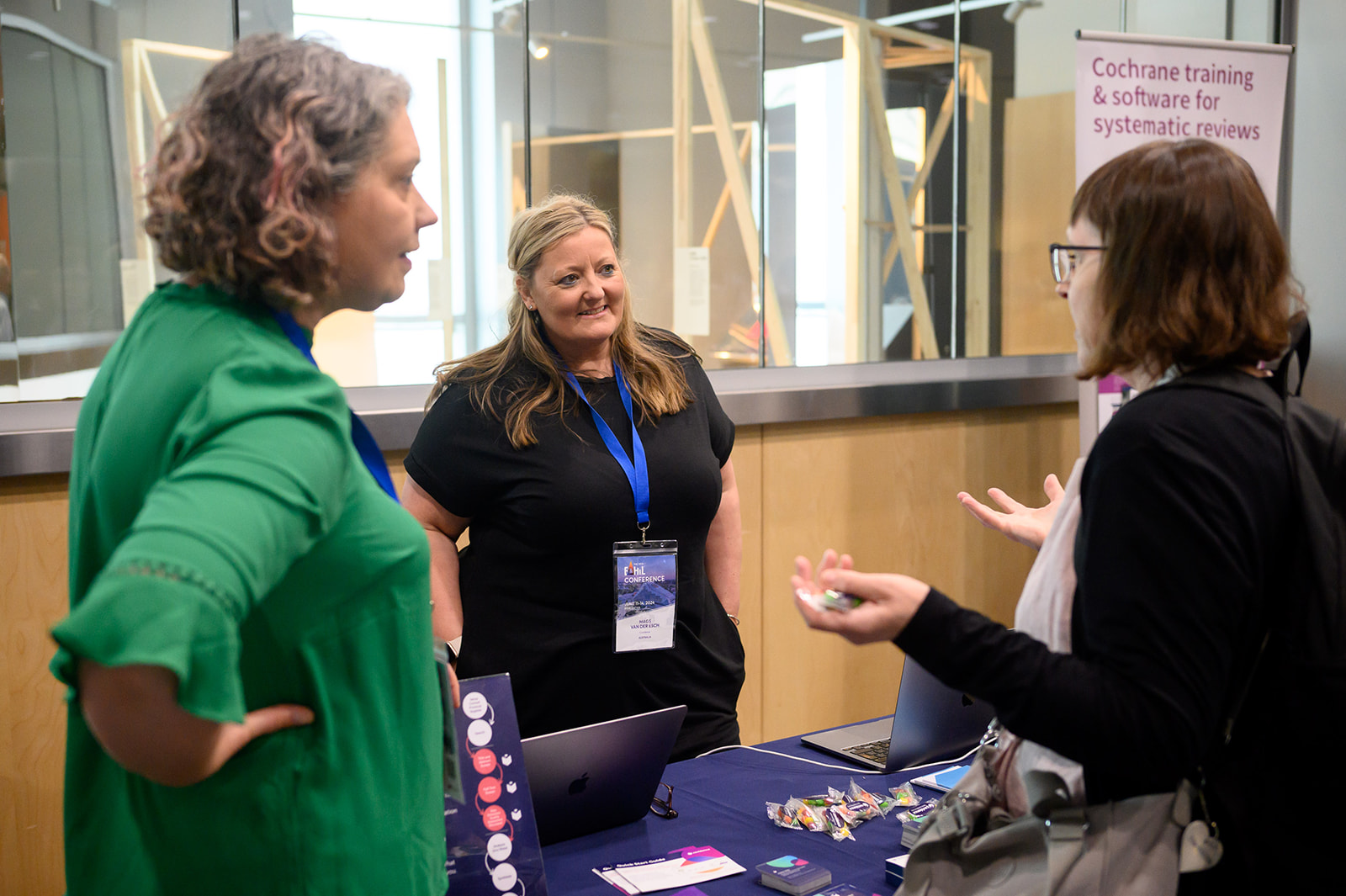
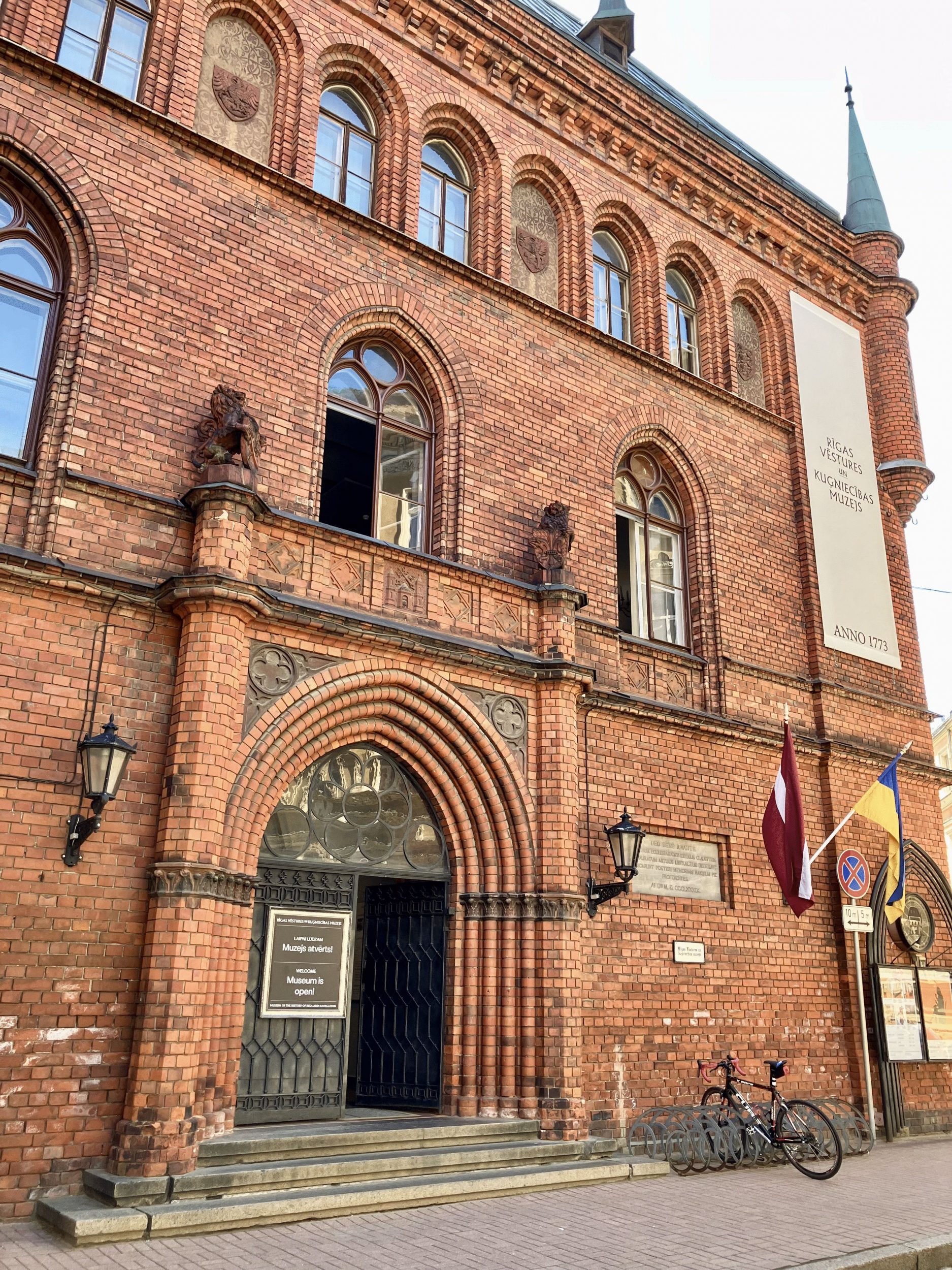
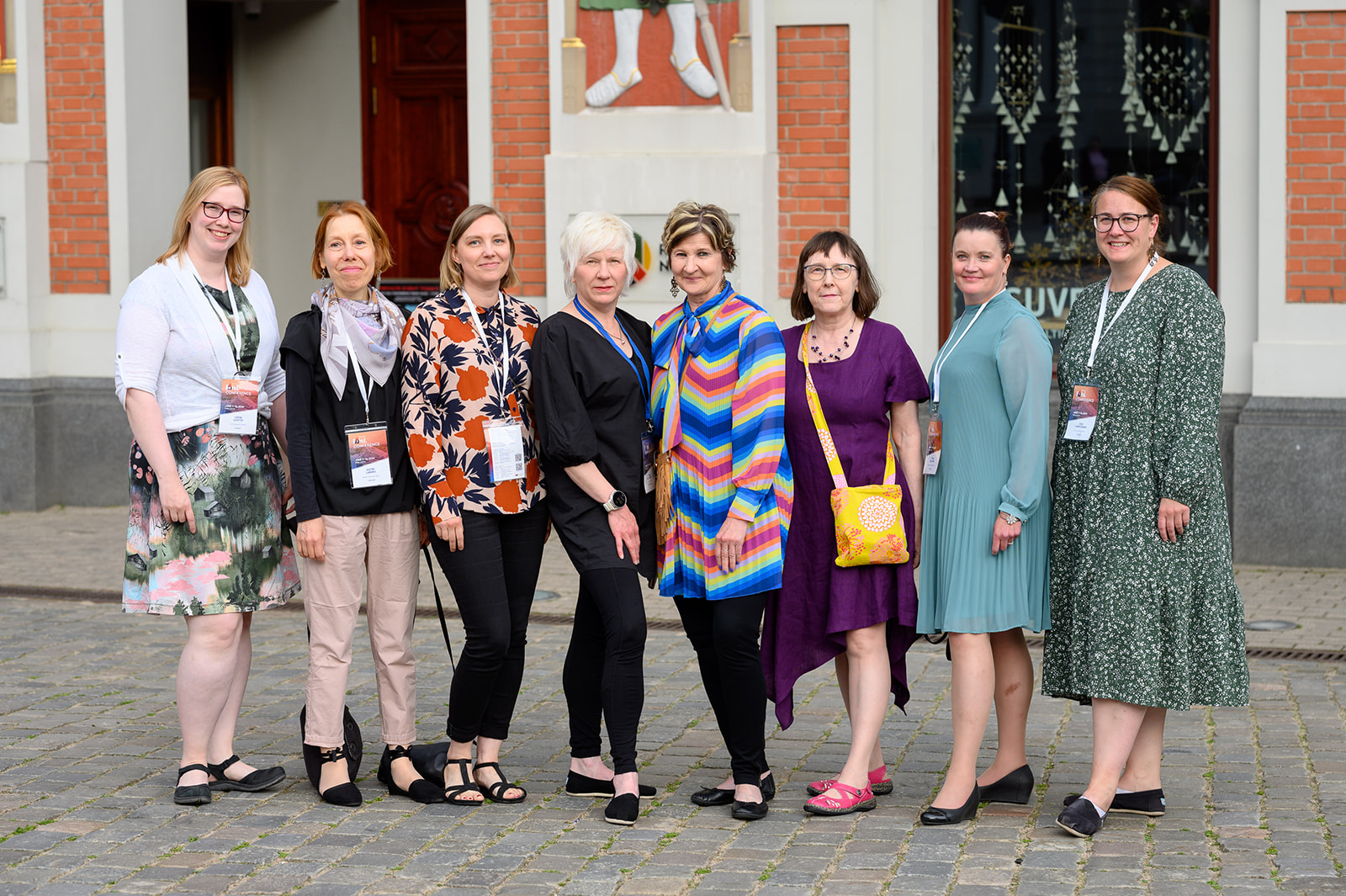
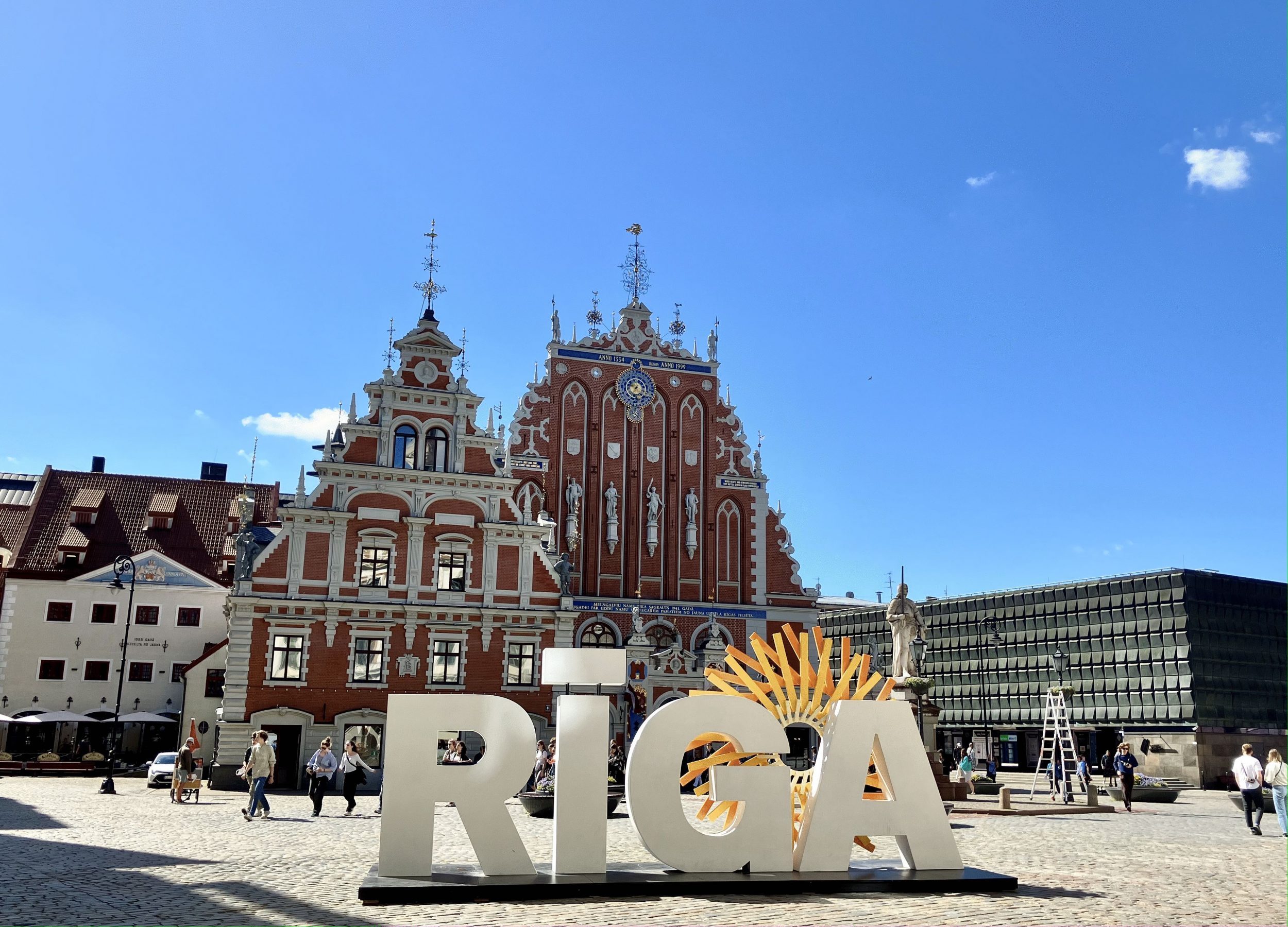
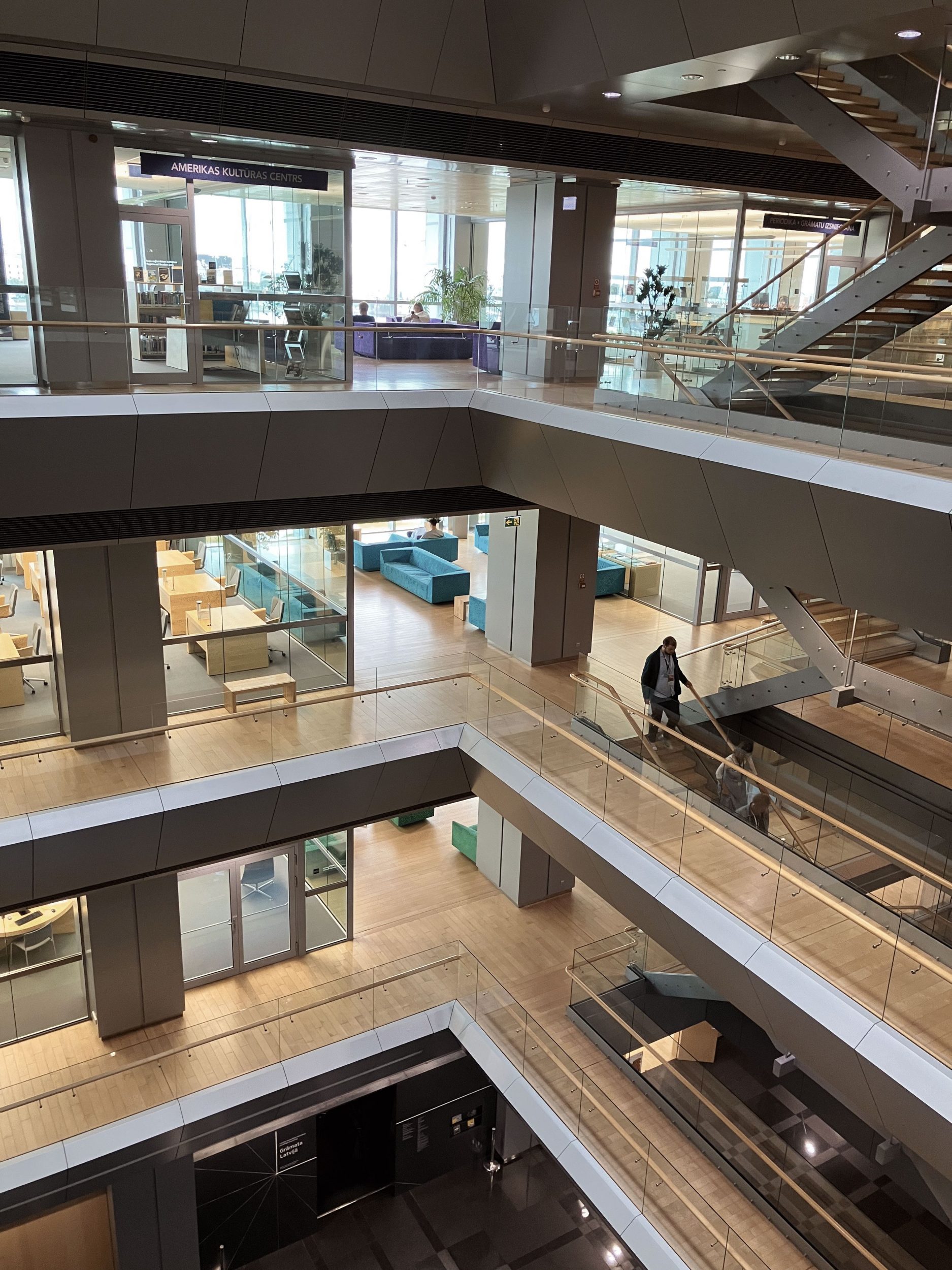
The European Association for Health Information and Libraries (EAHIL) brings together European and some non-European library and information service professionals working in medical and health sciences libraries and information services. The organisation supports the professional development of its members, promotes cooperation and enables the exchange of experiences with annual events as its main mean, alternating between conferences and workshops. This year’s conference was held in Riga, Latvia, from 12 to 15 June. The theme was ”Small Step and a Giant Leap: Reorienting Towards a New Environment”.
Continuing education course
The conference itself was preceded by continuing education courses (CEC). On Tuesday, I took a CEC on ”Beyond the systematic review search: search methods for Evidence and Gap Maps and other review type”. The course held by Morwenna Rogers (University of Exeter), Anthea Sutton (University of Sheffield) and Alison Bethel (University of Exeter) was a useful introduction to advanced methods and practices of information retrieval. I shall share the lessons of the course with my colleagues (after the holidays) so that we can better support researchers in their search for information in various review publications. Here is a tip for one tool: Right review, formerly known as ”What Review is Right for You?”
Keynotes
There were two keynote speeches. Wednesday’s keynote speaker Kristine Paberza-Ramiresa (IFLA) spoke about community-centred impact assessment. Friday’s keynote speaker Andrea Gasparini (University of Oslo) stressed that the use of artificial intelligence in research libraries is more about automating existing processes than creating true intelligence. Current AI systems rely heavily on man-made data and operations, so while AI can significantly improve efficiency, it does not replace human intelligence. Gasparini emphasised the importance of user-centred design in the development of AI tools. By prioritising user experience, libraries can ensure that these technologies are both efficient and ethically just.
Workshops
On Wednesday I attended a workshop called ”Creating a brand for your library”, led by Suzannah Bridge (Oxford University, Bodleian Libraries), and it was useful and fun. On Thursday I had my own workshop titled ”Promoting and marketing library and information services: tips and tools for creating a communication plan”. There were 14 active participants.
Panel discussion
The theme of artificial intelligence was also discussed on Thursday in a panel discussion, in which Andrea Gasparini, Simone Willis (University of Cardiff) and Marydee Ojala (Editor-in-Chief of KMWorld) took part, chaired by Fiona Brown (University of Edinburgh). The theme of the panel was ”The Benefits and Limitations of Automation and AI Tools in Research”. The discussion highlighted the need to create and review guidelines and recommendations to keep pace with rapid technological developments. It is important to test AI tools with users and share experiences both within and between organisations. For example, AI tools are useful for speeding up certain stages of systematic reviews, but they don’t replace people as much as they merely assist.
Parallel session on research and open science
There were a lot of parallel events on the agenda, and since no one can be in two places at the same time, I only managed to listen to one parallel session. Fortunately, participants have the option of viewing the recordings of parallel sessions afterwards. In the session I was following there were four interesting presentations: ”Data management skills for students of medical faculty and pharmacy: Our answers” by Iina Hepolehto and colleagues (University of Helsinki), ”Differences in search strategies and corresponding outputs between fields of technology Assessment (HTA) reports and other systematic reviews” by Erik Wikström (HTA South), ”An innovative approach to supporting evidence-based Adverse Outcome Pathways: a successful case study with librarians on the project team” by Elena Bernardi (Università degli studi di Milano) and colleagues, and ”Search summary tables – The collected wisdom of two organisations” by Alison Bethel (Univerisity of Exeter) and Klas Moberg (Swedish Agency for Health Technology Assessment and Assessment of Social Service).
Posters
There was also a poster exhibition. I was particularly interested in three posters: 1) ”Digital competence is essential!” by Therese Skagen, Irene Hunskår and Regina Lein from Norway. Their poster could be interacted with by attaching small stickers to it as signs of the areas of work where more digital expertise is most needed. The themes of developing competence are always of interest to me. 2) ”Fostering Collaboration and Community Engagement in New Library Spaces: Co-Planning, Gamification, and Shared Activities with Students and Staff”, by Essi Lempiäinen and Leeni Lehtiö (University of Turku). I would like to gamify co-development at UEF library as well. 3) ”Little Streams Make Big Rivers: Communication Strategies for an Expanded Research Service”, by Camilla Larsson, Sara Landerdahl Stridsberg and Julia Harrysson (University of Mälardalen). Everything related to communication arouses my interest because my task is to coordinate and develop the communications of our library. The poster makers also introduced their posters in a ”Poster Presentation Rapid-fire” session, where they had one minute of speaking time.
Library tour
The conference ended with a late lunch, after which many took the opportunity to visit the National Library of Latvia (Latvijas Nacionālā bibliotēka, founded in 1919) for more than just the conference centre on the lower floors. The huge, mountain-like building, opened in 2014, has eleven floors. It was designed by Latvian-born architect Gunnar Birkerts, who made his career in the United States. The library accommodates numerous different collections (more than five million titles and over 18,000 manuscripts in total) as well as permanent and changing exhibitions (posters, objects, etc.), and has a view over Riga from the top floor. We observed very few library users in the premises, but our visitor badges only allowed us access to certain parts of the library, not the reading rooms, for example.
In conclusion
The professionally and collegiately rewarding conference was excellently organised. The main themes in my opinion were user-centredness and working together. Whether it is the utilisation of AI and automation, developing professional skills or promoting open access, the focus is on strengthening the role of libraries. Despite the rapid development of artificial intelligence and other technology, the library remains a cornerstone of research and learning. Even though technology seems to be taking big strides in development, it is best for libraries to proceed step by step – not with hiccups, but with a plan.
Tuulevi Ovaska, erityistietoasiantuntija | Senior information specialist
Opetus- ja tietopalvelut | Training and information services